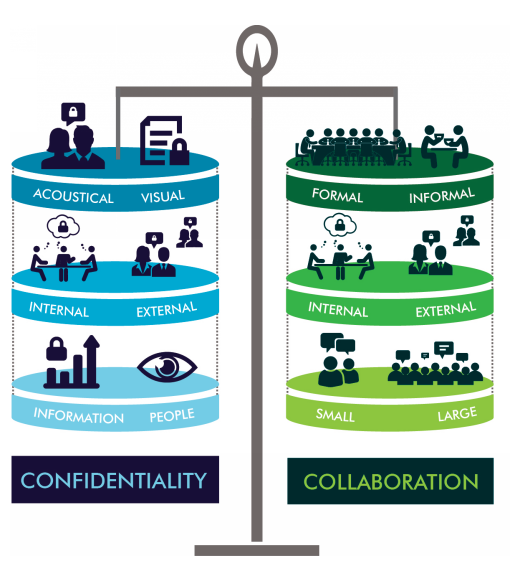While many of our clients are interested in acoustics because of information security issues, just as many are concerned about employee wellbeing and productivity. A 2001 research paper by organizational psychologists Cooper, Dewe, and O’Driscoll shows that poor noise conditions have a significant impact on the physical health and psychological wellness of workers. Furthermore, a study in 2000, using two test groups (one of which was subjected to realistic, open-office noise), supported earlier findings which definitively show that typical workplace noise levels can have a negative effect on both perceived stress levels and the presence of stress hormones in workers. Suffice it to say, acoustic privacy provides a host of benefits, but for this post our primary concern is information security, not employee wellbeing or unique, non-confidentiality-based operational soundproofing needs (e.g. recording studios, sensory deprivation rooms, testing rooms, etc.).
Classify Why Acoustic Confidentiality is Needed
To begin, classify the needs most likely to demand speech privacy in the workplace:
1. Trade secrets
As covered in our previous post, intellectual property becomes increasingly more impactful and valuable every year. A lack of acoustic confidentiality can lead to such potentially devastating consequences as product launch information being leaked to competitors, manufacturing advantages being lost, product designs being stolen, formulas being provided to competitors, etc.
2. Confidential government information
Particularly relevant to government contractors, sensitive information cannot fall into the wrong hands for reasons of national security, and while lax cybersecurityis more likely to be a cause of mishandled information, acoustic privacy is a significant part of designing for maximum confidentiality. Equal if not more stringent regulations govern government-operated Sensitive Compartmented Information Facilities, as laid out in Director of Central Intelligence Directive No. 6/9, Section 3.3.2
3. Legally-required speech privacy
While HIPAA regulations don’t require that existing structures retrofit for soundproofing purposes, new buildings are required to ensure that reasonable safeguards are taken to ensure that clients’ sensitive medical data is kept private.
4. Litigation
Whether for an attorney office, an internal legal department, or simply an area where a legal team might meet, this is one area where soundproofing should not be spared.
5. Human Resources, Management, and Implied Privacy
In this example confidentiality is designed to protect conversations that are delicate, but do not necessarily influence business operations. The Forbes Human Resources Council highlights the need for HR professionals to act with the utmost confidentiality when dealing with harassment complaints. Managers may face similar concerns regarding potentially sensitive conversations with subordinates. Lastly, there are certain spaces in an office where privacy is implied, such as phone rooms, and acoustic confidentiality is more a matter of employee trust than it is a legal requirement.
Determine How Much Acoustic Confidentiality is Needed
Once the need for confidentiality has been determined, it is best to determine what level of speech privacy is needed. While the need to protect trade secrets may seem like a high priority, the definition of a trade secret may be broad depending on your organization. For example, if your organization uses a formula in its product that gives it a competitive advantage, that information is likely to be limited to highly-qualified, highly-vetted employees, and acoustic privacy will be of the utmost privacy. But if your organization is releasing a new software update and may only gain a slight competitive edge by protecting this information, which is likely to be widely dispersed within your organization, then it will not need to be as highly protected as a formula or manufacturing advantage. In this example, some acoustic confidentiality is still important, but due to the wide diffusion of the information, taking extreme measures towards soundproofing may not be practical. In addition, the value of the information may not warrant the costs associated with soundproofing.


